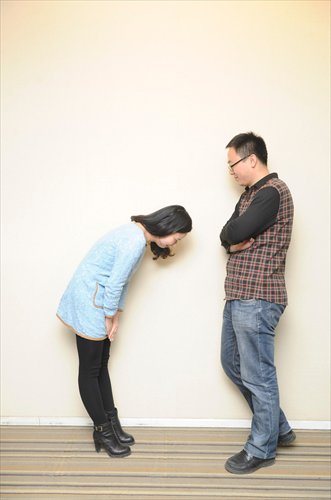A proper lady?
New meme heats up debate about the role of women in Chinese society
Mondai no Aru Restaurant ("A Restaurant With Many Problems"), a Japanese television drama about a group of women who open a bistro to combat male chauvinism in society, has reignited debate on China's social media networks about gender roles in Chinese society.
Discussion around the show, which has been available online since January, has popularized a new term among China's microblogging community: "Straight Woman Cancer." The term describes women who deliberately conform to the idea that an "ideal woman" should be demure, domesticated, and have no other goal in life than to serve the needs of men.
The term finds its counterpart in "Straight Man Cancer," describing men that hold the aforementioned views about women. The latter term has been in the media again recently, after a series of comments on Sina Weibo by well-known scholar Zhou Guoping stating that women should aspire "to be a gentle lover, a caring wife [and a] loving mother."
To mark yesterday's International Women's Day, which aims to raise awareness about women's struggle for social equality, Metropolitan explores the debate underlying the "Straight Woman Cancer" meme.

A new term, "Straight Woman Cancer," has been coined to describe women who deliberately conform to the traditional expectations of Chinese men. Photo: Li Hao/GT
An 'ideal woman'
Zhang Wangbin, a 31-year-old English teacher at a university in Taiyuan, Shanxi Province, is described by her independent-minded friends as "unique" for the way she seems to be able to happily embody the traditional Chinese ideal of how a woman should be. She is, according to her friends, gentle without fault and the paragon of feminine charm.
"I'm a traditional woman. It's undeniable that my 'feminine qualities' have won me favor with men," said Zhang, who is married with a 3-year-old daughter. "I was always popular with the boys at school and also later, when I started dating."
Zhang insisted that her attractiveness to men was due to her natural temperament, but admitted that there were advantages to being seen to conform to the traditional feminist ideal in Chinese society.
"I think this [my popularity] is because we are still living in a male-dominated world. Society still has a stereotype that women ought to be docile and submissive," said Zhang. "I'm naturally very feminine in my appearance and I behave in a gentle manner, so I conform to social expectations of what a woman should be."
Asked whether she has a problem with living in a male-dominated society, Zhang said she did not alter her personality to conform to men's expectations.
"Women still need to be independent and have self-respect," she said. "But it's not necessary to become a nühanzi (manly woman), which is going from one extreme to another."
Marvin Chen, a 26-year-old telecommunications worker based in Beijing, admitted that he was guilty of having "Straight Man Cancer."
"I would like my future wife to be a compliant person with a meek temperament," he said. Chen, who said he grew up in a family with traditional values, believed the worth of a woman was to be a diligent wife and mother who was dependent on her husband.
Chen acknowledged that on the one hand, society is changing in that women were now expected to work and had the ability to be economically-independent. But on the other hand, he said, women who are gentle, pretty and weak are still preferred by men.
"I agree that it's unfair, but that's the reality," said Chen. "In light of this, it's to be expected that some women have 'Straight Woman Cancer.'"
"I believe that these women are more likely to succeed in both family life and social life."

Women who are submissive, demure and docile have better prospects in China's marriage market. Photo: Li Hao/GT
Entrenched sexism?
Shao Tong is the founder of a private institution, the Deyu Female School, that runs classes and provides consultations to help Chinese women become "more feminine," as a way to attract men or to solve their relationship issues.
Shao told Metropolitan that it is necessary for women to learn how to be gentle, caring, sensitive, and to "never find fault with men in public" to achieve happiness in life.
"Women who are gentle and conform to traditional gender roles find it far easier to marry, and in most cases, they are happier than those manly women when it comes to married life," said Shao. "I have some students who are career women and don't know how to behave in an appropriate way for a woman. They come to me for help, because the men they meet are only interested in discussing business with them, rather than forming a romantic relationship with them."
Shao said she believes that feminists who argue for a collapse of traditional gender stereotypes and equal rights for women have gone too far. At the same time however, she disputed the idea that there wasn't gender equality in China, saying that it was simply a case "men and women have different roles."
"The most important thing in a woman's life is to maintain a steady family, respect her elders and take good care of the children," said Shao. "It's not important for a woman to make money."
Lü Pin, a feminist columnist and woman's rights advocate for Gender Watch, dismissed such views in an article "No Need to Be Afraid of Feminism" published on opinion.china.com.cn in July 2012.
In it, she wrote that "we are far from achieving gender equality" and that there was a "denial of gender inequality in our society." She pointed to the "many hindrances for women in family, society, politics and other areas in life, including violence, prejudice and poverty."
Lü told Metropolitan that the term "Straight Man Cancer" was a "wake-up call" for people to confront the double-standards and "male chauvinism" that still existed in Chinese society. But she objected to the use of "Straight Woman Cancer," as she felt it put the blame in the wrong place.
"It would appear that we are striking a blow against sexism with this word, but actually we are covertly attacking women by using it," she said. "The problem is that the description wrongfully blames women for [conforming to gender roles constructed by men.] The problem is with our society, not with women who perpetuate the stereotype [of a traditional woman]."
Lü elaborated that women who defended the system did so because it is easier to conform, rather than to fight against gender inequality.
"For some women who are persecuted under this patriarchal system, they are forced to rationalize and accept it," said Lü. "This is what Chinese women mean when they say they have a 'bitter fate.' People always anaesthetize themselves like this."
Lü said that the emergence of memes like "Straight Woman Cancer" could be powerful in provoking discussion and creating social change. She said however, she hoped the term "Straight Man Cancer" would endure, while "Straight Woman Cancer" would fade away.
"[The term 'Straight Man Cancer'] represents an awakening of women's consciousness about their place in society, and it is aimed at the right opponent, the patriarchy."
An outsider's perspective
Chris Hawke, a 46-year-old Canadian freelancer and musician who has lived in China for more than seven years, said that from his experience of dating Chinese women, he could understand what was meant by "Straight Woman Cancer." "But I've never dated docile Chinese women," said Hawke. "The [foreign] guys I know definitely expect their girlfriends to have their own lives and interests, and to be able to hold their own at dinner parties. "
Even within male-dominated paradigms in China of how women should be, said Hawke, there were differences as to what an "ideal woman" was, dependent on place and social organization. "[For example], the local women in my village [in Yunnan Province] carry the heavy loads and do the work while the men hang around and smoke," he said.
He noted that from what he had observed, Chinese men tended to like women who are "pretty," but was optimistic that "Straight Woman Cancer" was not as widespread as critics fear.
"I think when you are young, cultural pressure and hormones determine who you like, but as you get older, you discover your own preferences," said Hawke. "A culture can suggest ways for people to fulfill certain gender roles - but in the end it's all pretending and a person's real character will come to the surface."
Hawke gave the example of several of his male Western friends in China who had married Chinese women, only to find that their wives "changed from being nice to pushy after marriage." "If someone is trying to be this way or that way to attract a romantic partner, I pity them," said Hawke, who added that the pressure to conform to gender stereotypes was not limited to China. "No one has the energy to go through life being something they are not."